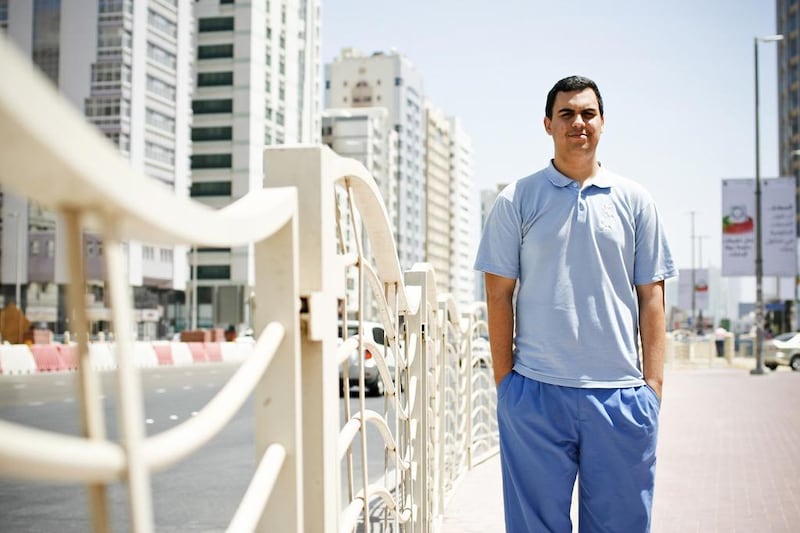ABU DHABI // Young Arabs believe the Arabic language is central to their identity but many believe it is losing its value as the use of English becomes more prevalent, according to an annual pan-Arab survey.
Of 3,500 people aged 18 to 24 polled for the Arab Youth Survey 2015, two-thirds say they are concerned about the declining use of Arabic and more than a third use English more than Arabic on a daily basis.
The phenomenon is particularly prevalent in among GCC nations where 56 per cent say they use English more than Arabic, versus 24 per cent in non-GCC countries. The survey, now in its seventh year, was conducted by international pollster Penn Schoen Berland in January and February. The company questioned male and female Arab nationals in 16 countries – the six Gulf Cooperation Council states of the UAE, Bahrain, Kuwait, Oman, Qatar, and Saudi Arabia, plus Algeria, Egypt, Iraq, Jordan, Lebanon, Libya, Morocco, Palestine, Tunisia and Yemen. For the first time, Syria was ommited.
Lebanese expatriate Mohamad Abdulhamid, 18, said he speaks mainly in English at school, given it is the language he is taught in. Despite this he tends to speak Arabic at home.
“My parents would not let me lose the language,” he said. When with friends, Mohamad uses both English and Arabic.
“We use a mixture of both,” he said.
Emirati Rowdha Ahmed, 22, also finds she flits between using Arabic and English when talking to friends.
“It is not because of love of one language but because you feel one word is more suitable in one language than the other,” she said.
The intern at Dubai Foundation for Women and Children suggested a fresh approach to encourage people not to lose their mother tongue.
“We already know it is our mother language,” she said. “But if they remind us of the beautiful literature it has, it might encourage us to read more.”
There is often more variety in Western literature and media than in Arabic, she said, which encourages people to spend their leisure time watching or reading in English.
“Therefore they do not practice their Arabic dialect a lot,” she said.
Egyptian Tariq Enheawi, a fellow student at Al Nahda National Schools, said he spoke English more than Arabic.
“Our school, they teach us in English so we do tend to speak English more,” he said.
The survey found those in the GCC particularly believe that Arabic is losing its value – 54 per cent compared to 43 per cent in non-GCC countries – and believed a knowledge of English can advance their career more than a working knowledge of Arabic (64 per cent).
Furthermore, 63 per cent agree that fluency in English can advance a career more than a similar fluency in Arabic.
Again, GCC countries (74 per cent) agree more than non-GCC states (56 per cent) about the greater value of English in the professional world.
“Youth in the GCC believe the Arabic language is losing its significance more than those in the rest of the region,” said Sunil John, chief executive of Asda’a Burson-Marsteller, the communications firm who commissioned the findings of the survey on Tuesday. “Youth recognise the importance of the Arabic language as part of their identity but as more jobs demand English skills, school curriculums place greater importance on foreign languages and influence of western pop culture rises, many believe knowing English will further their career.”
The survey found young people in the GCC are more confident about their national government’s ability to deal with the issue with 69 per cent expressing confidence their government can preserve the Arabic language.
While almost half of those polled (47 per cent) say the Arabic language was losing its value, one in three (34 per cent) disagree.
The survey addressed the concerns, priorities and future outlook of young Arab adults.
“Now in its seventh year, the Asda’a Burson- Marsteller Arab Youth Survey serves as a barometer, not only of the ever-evolving aspirations of Arab youth, the region’s largest demographic of over 200 million, but also of the overarching social, political and economic trends that define the Arab world,” said Mr John,
“Our approach to see and understand the Arab world’s unique dynamics through the eyes of its youth has also made the survey’s results relevant - and often the authoritative referral source - for policy makers and businesses.”
jbell@thenational.ae
______________________________________________________________
About 3,500 youths aged 18 to 24 years old were polled in the Arab Youth Survey 2015. The survey, now in its seventh year, was conducted by Penn Schoen Berland in January and February and questioned male and female Arab nationals in 16 countries. They were questioned on the relationship between Arabic language and their national identity, employment and the potential success of democracy in the Middle East and which country they would prefer to live in.
For the complete findings visit the Arab Youth Survey website.
Read more:
■ UAE remains top choice for Arab youths to live and work in'
■ Unemployment concerns prompting Arab youths to start businesses, survey finds
■ Arab youth 'uncertain about future of democracy in Middle East'






